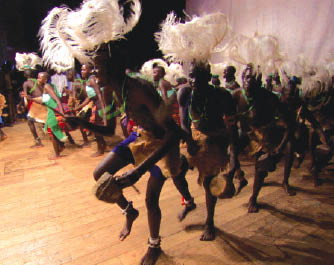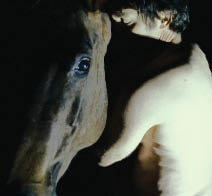The World On Screen
by M. Faust

Whether or not truth really is stranger than fiction, documentaries are about the only growth area of the film industry. They’ve been attracting exponentially larger audiences in recent years. Toronto’s Hot Docs, the largest documentary showcase in North America, recently concluded its 14th festival with numbers that must be the envy of Hollywood: Attendance was up an astonishing 33 percent over the previous year.
Even as Hollywood product searches for ever-lower possible common denominators, the range of subjects covered and styles used in nonfiction films continues to expand. Credit digital technology that puts filmmaking into the hands of anyone with more determination than money. And equal credit to a cableverse endlessly hungry for product, which gives struggling documentarians a hope that their work can be seen.
Less concerned than other festivals with premiering new films than with offering the best and most interesting of what is new, the programmers at Hot Docs obviously have a wide range of films to choose from, and in recent years have generally scheduled what turned out to be some of the following season’s biggest hits. It’s never possible to see everything you want to see, and I was sorry to have missed Strange Culture, about the FBI’s persecution of UB professor Steve Kurtz; Forever, a meditation on the visitors to Paris’ Peré-Lachaise cemetery that drew universal raves; and In the Shadow of the Moon, about the spirit of optimism that fueled the American space program of the 1960s.
Though Hot Docs did not show An Inconvenient Truth last year, they almost seemed to be making up for it this year with a number of striking environmentally themed films. (Or could it be that the issue is finally reaching critical mass in the public eye?) Everything’s Cool is a self-proclaimed “toxic comedy” that examines the disinformation put out by oil-industry-sponsored scientists hired to prove that there is no such thing as global warming. Despite having the preponderant weight of scientific opinion against them, they succeeded in convincing media outlets that there was a difference of opinion that deserved equal time in news coverage. Even aside from the issue at hand, Everything’s Cool demonstrates how easily the popular media can be manipulated to muddy issues of all kinds instead of clarifying them. (Local note: The film’s sound editor is Kelly Spivey, late of Buffalo’s Squeaky Wheel.)

A more hopeful film on the same topic, Garbage Warrior, received its world premiere at Hot Docs. It is a profile of renegade architect Michael Reynolds, who for 30 years has led a crew in the New Mexico desert in designing “earthship biotecture”—housing that uses recycled products and is completely self-sufficient. His ingenuity in creating such buildings is as rousing as his failures to persuade the state government to let him continue his experiments are frustrating. British filmmaker Oliver Hodge followed Reynolds over a period of three years, and cannily juxtaposes his bureaucratic battles with successes working with survivors of the Indian Ocean tsunami and hurricane Katrina. It’s a genuinely inspirational film on a subject where we could stand some hope.
As in recent years, more than a few of the most powerful films at Hot Docs opened with the HBO logo. To that list you can add Ghosts of Abu Ghraib, which you may already have seen on the premium cable channel (it will be available on DVD June 5). As with Everything’s Cool, the real story here is not what went on at the now-infamous US-run Iraqi prison (although it lays the history out in clear detail, making it a useful primer for those seeking to separate fact from fiction) but how the case was “spun” by the Pentagon and White House. Using interviews with some of the soldiers involved and experts in the field of torture, filmmaker Rory Kennedy puts the lie to the official “Animal House on the night shift” rationale that sought to obscure the real blame by claiming that these well-known extreme interrogation techniques were spontaneously devised by thrill-seeking misfits.
The most emotionally devastating film I saw at Hot Docs (given the state of the world, there’s never any lack of them) was one that sought to cast a light on a chapter in history not known to many Americans. Nanking combines interviews with survivors and newsreel footage to recreate what is known to historians with little hyperbole as “The Rape of Nanking,” the invasion of China by the Japanese in 1937 when more than 200,000 Chinese civilians were brutally massacred. Director Bill Guttentag opens the film as a staged reading by a group of actors (among them Jurgen Prochnow, Woody Harrelson, Stephen Dorff, John Getz and Mariel Hemingway) from the letters of European and American businessmen, missionaries and doctors who lived in Nanking, and it initially seems oddly distancing. But the reason for the technique soon becomes apparent: If ever a story needed some leavening to make it viewable to a larger audience, this is it.
The ability of one group of human beings to slaughter another has certainly not vanished from the earth, and several Hot Docs entries in recent years have presented shocking accounts of recent atrocities in Uganda, where the rebel group the Lord’s Resistance Army has driven millions of people into camps and conscripted children into service, forcing them to commit acts so horrifying it’s difficult to get your mind around what you’re hearing. That some of these films haven’t been seen by a wider audience is perhaps understandable: How do you get an audience to pay money to be subjected to such misery? War/Dance, winner of the audience award for best film, finds a way to explore the horrors of Uganda through a prism of hope for the future. The subject is a national dance and music competition where the finalists include a school from one of the most remote refugee camps. Beautifully shot on film instead of digital video (well worth the expense giving the dazzling landscapes), War/Dance focuses on the children’s pride and excitement while filling us in on the horrors they have already faced in their young lives. It will be distributed in the US by the edgy company ThinkFilm.

A different kind of child abuse was on display in Circus School, a Chinese film that recalls the unflinching verite style of Frederick Wiseman. Filmmakers Jing Guo and Ke Dingding had apparently (and surprisingly) unlimited access to the Shanghai Circus school, where the astonishing Chinese acrobats who regularly tour the world are trained. It’s no shock to learn that their skills come from years of hard training. But watching as these children are tossed through the air and contorted into positions unnatural to the human body (to say nothing of the psychological abuse on display), you have to seriously wonder if such skills are worth the price they pay.
Of course, not every documentary film on display was about the dark side of life. The delightful German entry Echoes of Home looks at three Swiss performers who work in that oddest of the vocal arts, yodeling. I was surprised to learn that, far from being a hidebound art, yodeling has a wide variety of styles ranging from traditional to freeform performers who make Bjork sound like Doris Day. Parents, send your kids to yodeling classes now and they’ll be on top of the next big thing in music! Well, maybe.
Scott Walker was once the next big thing—as part of the Walker Brothers, he was a huge star in England in the mid 1960s with hits like “The Sun Ain’t Gonna Shine Anymore” and “Make It Easy on Yourself.” But he didn’t much care for stardom, and after an early solo career fizzled out he retreated, becoming the most infamous rock recluse this side of Syd Barrett. That he cooperated with the making of Scott Walker: 30 Century Man will astonish those of his fans who have kept up with his increasingly idiosyncratic and dark recent work (three albums since 1984). That he doesn’t give up much in the way of personal information will be less surprising (a reference to his past “imbibing,” an admission that he always has nightmares). Still, as lovingly directed by Stephen Kijak (Cinemania), it’s a good introduction to a cult figure still largely waiting to be discovered in the US.
As for plumbing the depths of the human soul, though, the most daring film I saw had to be Zoo. It is based on a news story that you may have tried to put out of your mind if you heard it in July 2005, about a Seattle man who died after having sex with an Arabian stallion. That’s not a metaphor—we’re talking an actual, four-legged horse here. I will immediately reassure you that director Robinson Devor is not out to provide cheap thrills, not even cheap thrills gussied up with a highbrow tone. He obtained interviews with the dead man’s friends, a circle of men who shared his predilection, but recreates them with actors. We see them generally in shadows, which matches the way they speak—seldom directly addressing he subject of zoophilia, but mostly talking about their isolation from other people. Obviously not for all tastes, it’s an unsettling film that opens a corner to a forbidden desire and makes us wonder whether we’re satisfied with what we see.
|
Issue Navigation> Issue Index > v6n19: The Organic Mr. Bacon (5/10/07) > The World On Screen This Week's Issue • Artvoice Daily • Artvoice TV • Events Calendar • Classifieds |









 Current Issue
Current Issue